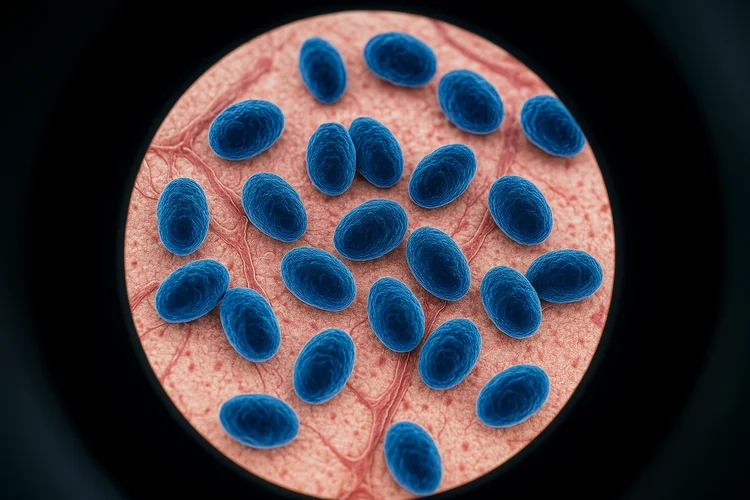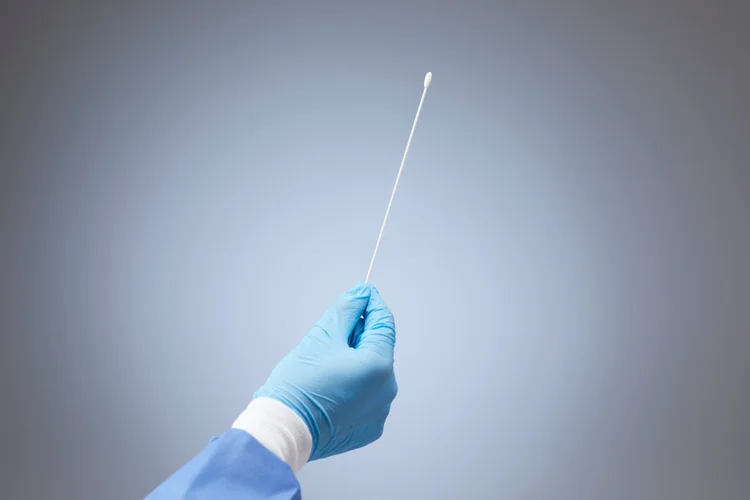Ureaplasma: Symptoms, Testing, and Treatment in Singapore
Last updated: Feb 20, 2026
| Test Options |
|
| Treatment | Oral antibiotics |
| Price |
|
| Appointment Options |
Same-day appointment (subject to availability). Book via WhatsApp: 88770326 or email: camden@atamed.sg |
| Clinic Locations |
Orchard: 1 Orchard Blvd
#05-09 Camden Medical Centre, S248649 Tanjong Pagar: 72 Anson Rd #01-02 Anson House, S079911 Jurong: 21 Jurong Gateway Rd, #02-08 CPF Jurong Building, S608546 |
What Is Ureaplasma?
Ureaplasma refers to a group of bacteria that naturally live in the urinary and genital
tracts of both men and women, but can sometimes cause infections when they overgrow
or enter areas of the body where they are not typically found.
These bacteria are part of the Mycoplasmataceae family and differ from typical
bacteria because they lack a cell wall, which makes them resistant to certain antibiotics.
There are two main species known to affect humans: Ureaplasma urealyticum and Ureaplasma
parvum. Many people carry these bacteria without symptoms, but in some cases,
ureaplasma can contribute to reproductive, urinary, or genital tract issues.

How Is Ureaplasma Transmitted?
Ureaplasma is primarily transmitted through sexual contact, including vaginal,
oral, or anal intercourse. Because the bacteria often cause no symptoms, individuals may unknowingly
pass them to sexual partners.
Although ureaplasma is not officially classified as a sexually
transmitted infection (STI), it is closely linked to sexual activity and
frequently found alongside other STIs. Transmission can also occur from mother to baby during childbirth.
Ureaplasma Infection Symptoms

Ureaplasma infection is often asymptomatic but can cause a range of symptoms when the
bacteria multiply excessively or are present with other infections.
When symptoms do occur, they may include:
- Unusual vaginal or penile discharge
- Pain or burning during urination (dysuria)
- Genital discomfort or itching
- Pain during sexual intercourse (dyspareunia)
- Pelvic or lower abdominal pain
What Are the Risks of Untreated Ureaplasma?
If left untreated, ureaplasma can occasionally lead to complications, particularly in individuals with existing risk factors. These may include:
- Bacterial vaginosis, cervicitis, or endometritis in women.
- Chronic nongonococcal urethritis or prostatitis in men.
- Fertility-related issues, such as reduced sperm motility or difficulty conceiving.
- Pregnancy complications, including premature birth, chorioamnionitis, or neonatal infections.
The presence of ureaplasma does not always indicate a problem, but if linked to symptoms or complications, it’s important to seek medical advice.
How Is Ureaplasma Diagnosed?
Ureaplasma is usually diagnosed using a swab from the cervix, urethra, or vagina, or a urine sample, as the bacteria live in the genital and urinary tracts.
These samples are tested using specialised laboratory methods, as ureaplasma cannot be
detected through standard bacterial cultures due to its lack of a cell wall and other unique
characteristics.
Common diagnostic methods include:
- PCR (Polymerase Chain Reaction) Testing – A molecular test to identify the bacteria’s genetic material (DNA). It is the most sensitive and widely used method.
- Culture Tests – Use the collected sample to grow Ureaplasma in the laboratory and confirm its presence.
- Combined STI Tests (Multiplex Panels) – Broader tests that screen for multiple sexually transmitted infections, including Ureaplasma.

When Is Ureaplasma Treatment Recommended?
Treatment for ureaplasma typically involves antibiotics and is recommended when symptoms are
present, or if the infection is recurrent, or associated with fertility issues,
pregnancy complications, or other coexisting conditions.
Common antibiotics used include:
In some cases, follow-up testing may be advised after treatment to confirm that the infection has fully cleared.
Ureaplasma Test & Treatment Cost in Singapore
At ATA Medical, we provide discreet and confidential testing for ureaplasma infections, along with treatment when indicated. Our prices are as follows:
| Test / Treatment | Test Type | Price* |
|---|---|---|
| Consultation | From $49.05 | |
| Testing | ||
| Urogenital Mycoplasma Swab Test | Swab | $76.30 |
|
Enhanced Female Genital Screen (9 tests) Chlamydia, Gonorrhoea, Mycoplasma genitalium, Mycoplasma hominis, Trichomonas, Ureaplasma parvum, Ureaplasma urealyticum, Candida, Gardnerella Vaginosis |
Swab | $348 |
|
Complete Female STD Screen (15 tests) HIV, Syphilis, Hepatitis B, Hepatitis C, Herpes Simplex Virus 1 and 2, Chlamydia, Gonorrhoea, Mycoplasma genitalium, Mycoplasma hominis, Trichomonas, Ureaplasma parvum, Ureaplasma urealyticum, Candida, Gardnerella Vaginosis |
Blood + Swab | $478 |
|
Male Genital Screen (8 tests) Chlamydia, Gonorrhoea, Mycoplasma genitalium, Mycoplasma hominis, Trichomonas, Ureaplasma parvum, Ureaplasma urealyticum, Monilia |
Urine | $318 |
|
Complete Male STD Screen (14 tests) HIV, Syphilis, Hepatitis B, Hepatitis C, Herpes Simplex Virus 1 and 2, Chlamydia, Gonorrhoea, Mycoplasma genitalium, Mycoplasma hominis, Trichomonas, Ureaplasma parvum, Ureaplasma urealyticum, Monilia |
Blood + Urine | $428 |
|
Enhanced Genital Ulcer Testing (18 tests) HIV, Syphilis (swab + blood test), Hepatitis B, Hepatitis C, Chlamydia, Gonorrhoea, Mycoplasma genitalium, Mycoplasma hominis, Trichomonas, Ureaplasma parvum, Ureaplasma urealyticum, Herpes Simplex Virus 1 and 2, Haemophilus Ducreyi (Chancroid), Cytomegalovirus, Lymphogranuloma, Venereum, Treponema Pallidum (Syphilis), Varicella Zoster Virus |
Blood + Swab | $538 |
| Treatment | ||
| Oral Antibiotics | From $1.09 per tab | |
^Prices last updated on Jan 28, 2026. While every effort is made to keep pricing information up to date, please contact our team to confirm the latest rates.
We offer confidential testing and
treatment for sexually transmitted infections (STIs), available as standalone tests or part
of comprehensive screening packages. To support your comfort and preferences, both male and female
doctors are available upon request.
For details about available tests, treatment options, or to book an appointment, please contact
us directly.
How Can Ureaplasma Be Prevented?
Although ureaplasma is commonly found in the genital and urinary tracts of healthy individuals, several measures can help reduce the risk of symptomatic infection or transmission:
- Use condoms correctly and consistently during sexual activity.
- Undergo regular sexual health screening if sexually active.
- Seek prompt treatment for symptoms or coexisting infections.
- Communicate openly with partners about sexual health.
In cases involving planned pregnancy or fertility assessments, both partners may be advised to undergo screening and treatment if ureaplasma is detected.
What Should You Do if You Suspect Ureaplasma?
You should see a doctor if you experience symptoms that are persistent, recurrent, or causing discomfort, such as:
- You have pain or burning during urination.
- You notice unusual vaginal or penile discharge.
- You experience pelvic pain or genital discomfort.
- You are concerned about possible exposure or a recent sexual encounter.
- Your symptoms do not improve or continue to return.
Book an Appointment for Ureaplasma Testing
ATA Medical @ Tanjong Pagar
Nearest MRT: Tanjong Pagar Station (EW15)
Contact Number: 6223 0682
Email: hi@atamed.sg
Opening Hours:
Mon - Fri: 8:30 AM to 12:30 PM, 1:30 PM to 5:30 PM
Sat: 8:30 AM to 12:30 PM
Sun & PH: Closed
ATA Medical @ Orchard
Nearest MRT: Orchard Boulevard Station (TE13)
Contact Number: 6223 0682
Email: camden@atamed.sg
Opening Hours:
Mon - Fri: 8:30 AM to 12:30 PM, 1:30 PM to 5:30 PM
Sat: 8:30 AM to 12:30 PM
Sun & PH: Closed
ATA Medical @ Jurong
Nearest MRT: Jurong East MRT Station (NS1/EW24)
Contact Number: 6348 6292
Email: jurong@atamed.sg
Opening Hours:
Mon - Fri: 8:30 AM to 12:30 PM, 1:30 PM to 5:30 PM
Sat: 8:30 AM to 12:30 PM
Sun & PH: Closed


